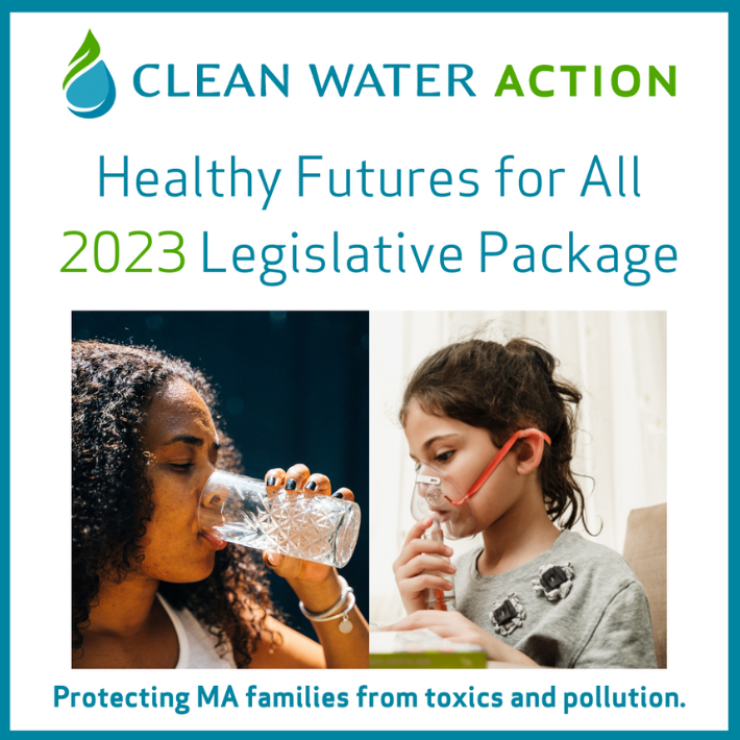The Massachusetts Legislature has the opportunity to protect residents, particularly children, from exposure to health-threatening toxics and pollution by passing the full Healthy Futures for All legislative package this session. These are Clean Water Action’s top priorities in 2023. Together, this group of bills will ensure that no community is left behind as we make Massachusetts cleaner, healthier, and safer for everyone, especially the youngest residents of the Commonwealth.
What’s in the Healthy Futures for All package?
An Act to protect Massachusetts public health from PFAS - H.2197 (Hogan) / S.1356 (Cyr)
PFAS are a class of over 9000 chemicals that are found in a wide array of consumer products. Unfortunately, those PFAS that have been studied are toxic at very low levels, and their manufacture, use, and disposal contaminate drinking water systems and private wells throughout Massachusetts. This legislation bans PFAS in food packaging, children's products, fabric treatments, personal care products, cookware, and firefighters’ personal protective equipment by 2026 and bans PFAS in all products by 2030. The bill also sets up a process to restrict PFAS discharges to groundwater and surface water, requires manufacturers to disclose if they add PFAS to products, and establishes a fund for testing and remediation.
An Act for toxic free kids - S.2564 (Friedman, Hawkins)
Harmful substances including PFAS are in children's clothing, toys, art supplies, personal care products, bedding, and more. This legislation requires businesses that make or sell children’s products in Massachusetts to disclose toxic chemicals added to those products. It also bans PFAS in children’s products, including artificial turf, and establishes a process for banning additional toxic chemicals and chemical classes every 3 years. Not every family has the resources to pay a premium for products marketed as being free of harmful substances, and toxic-free kids’ products should be the norm, not a privilege.
An Act protecting our soil and farms from PFAS contamination - H.101 (Schmid) / S.39 (Comerford)
This bill requires the Department of Environmental Protection (DEP) to test biosolids for PFAS and make the test results available to potential users including land owners and compost and fertilizer facilities. It requires biosolids sold on the retail market to have warning labels and requires the DEP to set standards for the maximum amount of PFAS that may be in retail products. The bill also establishes a fund to compensate farmers from losses incurred due to the discovery of high PFAS levels at farms.
An Act to improve outdoor and indoor air quality for communities burdened by pollution - H.2131 (Barber, Connolly) / S.1382 (Jehlen)
Everyone should have a right to clean air, but residents across the Commonwealth are exposed to emissions from dirty energy generating stations, transportation pollution, and even sources within our homes like gas stoves. This pollution burden is not distributed evenly. An analysis found that residents of color in Massachusetts are exposed to 26 - 36% more pollution from vehicle emissions than white residents1. This bill requires new air monitoring stations for pollutants, including black carbon and ultrafine particulate matter, to establish a baseline of air pollution in neighborhoods overburdened by transportation pollution and includes ambitious goals to ratchet that pollution level down.
Additionally, the bill requires the installation of air filters in existing eligible buildings, mandates advanced HVAC filtration systems for new eligible buildings, upgrades state codes to improve mold enforcement, and prohibits the installation of gas stoves in new eligible buildings, so children and other residents can breathe cleaner air in daycares, schools, public housing, and other spaces overburdened with transportation pollution.
An Act relative to energy facilities siting improvement to address environmental justice, climate, and public health - H.3187 (Madaro) / S.2113 (DiDomenico, Edwards)
The years-long fight to prevent a polluting substation from being constructed in East Boston illustrates a larger problem: environmental justice (EJ) communities do not have enough power to stop polluting facilities from being built in their neighborhoods. This bill requires a cumulative impact assessment and an EJ impact statement before the Energy Facilities Siting Board approves any electricity generating facility or oil, gas, or substation facility. Additionally, it prohibits the approval of electricity generating facilities or substations if the EJ impact statement shows that they would result in public health or other harms to EJ populations.
An Act establishing a zero carbon renovation fund - H.3232 (Vargas) / S.2365 (Gomez)
Building emissions are a significant source of Massachusetts greenhouse gas emissions, and older structures will need to be updated in order to meet the state’s legally binding climate goals. This legislation dedicates $300 million of existing funds toward a “Zero Carbon Renovation Fund” for energy efficiency, clean energy, and electrification upgrades targeting affordable housing, public housing, and homes rented or owned by low and moderate income households. The funds could also be used for upgrades in municipal buildings like schools and certain small businesses.
By focusing on upgrades to buildings owned and occupied by low and moderate income families, this bill equitably reduces building emissions while also saving residents money and improving indoor air quality.
An Act ensuring safe drinking water at schools - H.851 (Lipper-Garabedian) / S.526 (Lovely)
This bill requires school and childcare facilities to test their drinking water outlets for lead and mandates remediation if elevated lead levels are found. The bill authorizes remediation funding under the state Water Pollution Abatement Revolving Fund.
2 “Chemical Lies,” Natural Resources Defense Council, 2022.
